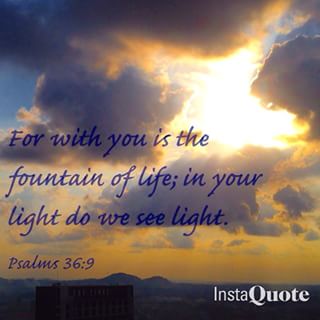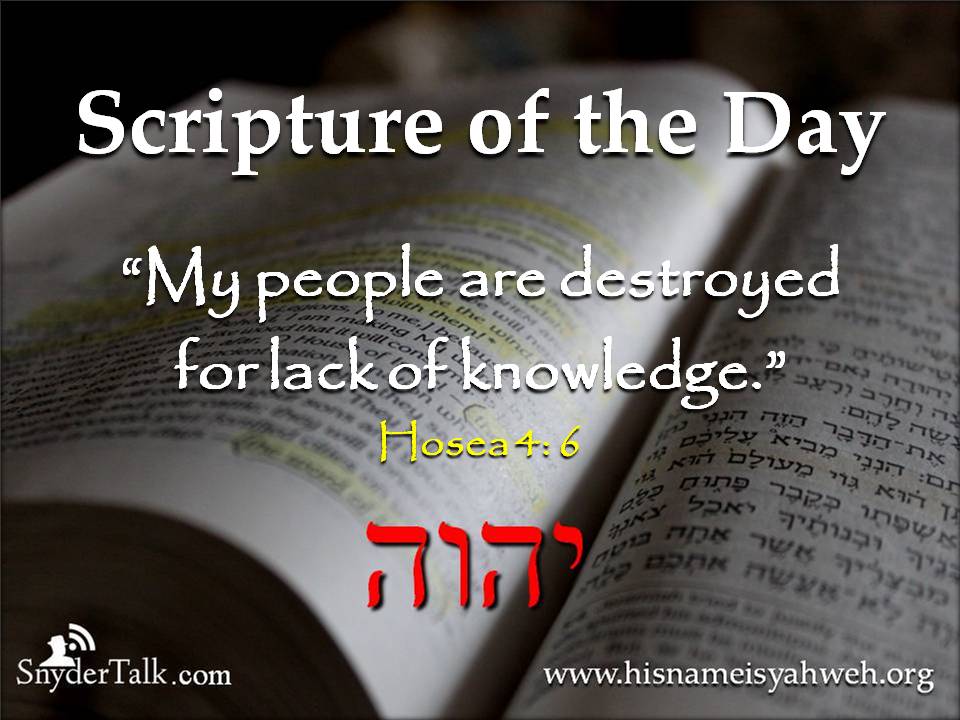[This is part of the series QUID EST VERITAS or “What is truth?” — first posted in 2013. Other related posts:
- Pilate: ‘Quid est veritas?’ – Gospel Truth? – 1
- “Quid est Veritas”: Gospel Truth? – 2
- “Quid est veritas?” – Gospel Truth – 3
- Quid est Veritas – 4 – Old Truth, New Truth, Half Truths, All Truth and Nothing But . . .
We have taken the liberty of replacing “the LORD” with the Tetragrammaton Name YHWH, for surely, David would have been praising the God He knew and whose Name he would have uttered in prayer, just as we do! In this world of many gods with different names being called on by those who believe in them as their god, we need to be more precise about whose Name are we calling? If the Name of our God is YHWH, then call on YHWH, name Him . . . unless the name of your God is another or unless the God named YHWH prohibited the utterance of His Name which He never did. Why should He? Commandment #3 prohibits “taking His Name in vain”, that is not what we do at this website. We proudly declare the Name of our God, the God of Israel, the God of all nations. He has revealed His Name as YHWH, how else would anyone have known, including Moses and the chosen people to whom He repeatedly declared it?—Admin1.]
———————–
The Psalms are said to be the prayers of Israel. The writers were inspired to express their awe and reverence for YHWH and a deep consciousness of and concern for His TORAH. Psalmists felt free to call upon the Name during times of difficulty or distress but more so to praise Him at all times and on all or no occasions.
One thing we do have to remember about the Psalms is that they are mere expressions of men, as men understood their God. They might have been inspired by love of YHWH, but they are NOT in the category of “Divine Revelation” in the same way the Torah is. They might contain divinely revealed truth, based on Torah, but no matter how lofty and poetic is their style, still, they are mere expressions of men. We do not build doctrines based on Psalms unless they are faithful to the Torah but, we presume, since the collection did make it into the canon of the Hebrew Scriptures, they do not contradict divinely revealed Truth. i.e., the TORAH of Israel’s God, YHWH.
There was a time when we considered the Psalms with the same regard we had for the whole Christian Bible from Genesis to Revelation, being made to believe that 37 ‘OT’ books and 27 ‘NT’ books were “the very words of God.”
We never questioned the claim that they were “God-breathed” even if we read them in translation instead of their original language. That belief was eventually abandoned as we began to research modern scholarship on the books composing the Bible. Any book that claims to be the ‘word of God’ is bound to draw much skepticism accompanied by nonstop and endless scholarship, such that the Bible is probably the most studied book by textual critics, archeologists, hermeneutics experts, and historians. And it is no big surprise that the Book is still the most printed-published-sold but probably least read, much less truly understood!
Eventually, the bible we considered “divine revelation” started shrinking, first from the whole “Christian Bible” to only the ‘Old Testament” and ultimately, after much study, discussion, deliberation and better understanding of how the canon was put together, discerning between the words of men and words of YHWH, our “bible” shrank to the Torah, the first five books that are foundational to the rest of the Hebrew Scriptures and, as even Christianity claims, their “Old” is foundational to their “New” Testament.
Regardless of their status, the Psalms which we shall now call by their Hebrew terms “Tehillim” — are beautiful expressions for personal and community prayer and it is not surprising that many Psalms do make it into the reading list of ‘literary masterpieces’. They belong to the category of “The Writings” or Ketuvim in the TNK, inspired writings but not ‘the very words of YHWH”.
———————————————-
Psalms/Tehillim 145
Great Is YHWH
A Song of Praise. Of David.
1 I will extol you, my God and King,
and bless your name forever and ever.
2 Every day I will bless you
land praise your name forever and ever.
3 Great is YHWH, and greatly to be praised,
and his greatness is unsearchable.
4 One generation shall commend your works to another,
and shall declare your mighty acts.
5 On the glorious splendor of your majesty,
and on your wondrous works, I will meditate.
6 They shall speak of the might of your awesome deeds,
and I will declare your greatness.
7 They shall pour forth the fame of your rabundant goodness
and shall sing aloud of your righteousness.
8 YHWH gracious and merciful,
slow to anger and abounding in steadfast love.
9 YHWH is good to all,
and his mercy is over all that he has made.
10 All your works shall give thanks to you, O Lord,
and all your saints shall bless you!
11 They shall speak of the glory of your kingdom
and tell of your power,
12 to make known to the children of man your mighty deeds,
and the glorious splendor of your kingdom.
13 Your kingdom is an everlasting kingdom,
and your dominion endures throughout all generations.
[YHWH is faithful in all his words
and kind in all his works.]
14 YHWH upholds all who are falling
and braises up all who are bowed down.
15 The eyes of all look to you,
and you give them their food in due season.
16 You open your hand;
you satisfy the desire of every living thing.
17 YHWH is frighteous in all his ways
and kind in all his works.
18 YHWH is near to all who call on him,
to all who call on him in truth.
19 He fulfills the desire of those who fear him;
he also hears their cry and saves them.
20 YHWH preserves all who love him,
but all the wicked he will destroy.
21 My mouth will speak the praise of YHWH,
and let all flesh bless his holy name forever and ever.
It matters no longer who originally penned Psalm/Tehillim 145; it expresses the impact upon the psalmist of the awesome greatness of his God. If we were reading the Christian, Messianic, or Jewish translation of this psalm, we could so easily attribute all the words of praise to the ‘deity’ of each religion cited.
Ponder:
- Is the god worshipped by Christians/Messianics and Jews one and the same??
- Are the generic terms ‘god’ or ‘lord’ sufficient to address the One specifically being addressed in this psalm and all the150 psalms?
- Even if we connect ‘god’ and ‘lord’ to more qualifying terms such as ‘redeemer’, ‘savior’, ‘deliverer’, ‘creator’ and more descriptive nouns, do these specifically identify the specific deity being addressed?
The answer is no. By not naming the ‘Lord’ being prayed to, each believer could turn the prayer into one that praises his specific ‘god’. In the case of the Christian and Messianic, what ‘name’ would they be calling upon? And as for the Jew who dares not pronounce the name of his god, he knows whom he is addressing but for those who don’t know the name of his god, they might hazard a guess, but since he (Jew) will not stand for the Name being uttered, specially by a gentile, would we dare say it to him? And why not?
And this is why we have chosen a specific translation of the Hebrew Scriptures to consistently feature in this website. How will anyone ever know the Name and the Truth associated with that Name–
- unless we print THE NAME and not just “Ha Shem” or “the Name”?
- and declare it to those who have not heard,
- or might have heard but forgot,
- or dare not utter,
- or didn’t believe THAT was THE NAME because it sounds too strange,
- or had a name-change when the nature of God was changed?
Did the Elohim Who spoke and revealed His Name to Moses and the mixed multitude ever say “I’ll tell you My Name but do not utter it, nor declare it to others, it’s a secret between us.”
Ridiculous? Truly, how can people “call on the Name” without uttering the Name?
Exodus/Shemoth 6:1-13
1 YHVH said to Moshe:
Now you will see what I will do to Pharaoh:
for with a strong hand he will send them free,
and with a strong hand he will drive them out of his land.
2 God spoke to Moshe,
he said to him:
I am YHVH.
3 I was seen by Avraham, by Yitzhak, and by Yaakov
as God Shaddai,
but (by) my name YHVH I was not known to them.
4 I also established my covenant with them,
to give them the land of Canaan,
the land of their sojournings, where they had sojourned.
5 And I have also heard the moaning of the Children of Israel,
whom Egypt is holding-in-servitude,
and I have called-to-mind my covenant.
6 Therefore,
say to the Children of Israel:
I am YHVH;
I will bring you out
from beneath the burdens of Egypt,
I will rescue you
from servitude to them,
I will redeem you
with an outstretched arm, with great (acts of) judgment;
7 I will take you
for me as a people,
and I will be for you
as a God;
and you shall know
that I am YHVH your God,
who brings you out
from beneath the burdens of Egypt.
8 I will bring you
into the land (over) which I lifted my hand (in an oath) to give to Avraham, to Yitzhak, and to Yaakov.
I will give it to you as a possession,
I, YHVH.
9 Moshe spoke thus to the Children of Israel.
But they did not hearken to Moshe,
out of shortness of spirit and out of hard servitude.
10 YHVH spoke to Moshe, saying:
11 Go in, speak to Pharaoh king of Egypt,
that he may send free the Children of Israel from his land.
12 Moshe spoke before YHVH, saying:
Here, (if) the Children of Israel do not hearken to me,
how will Pharaoh hearken to me?
-and I am of foreskinned lips!
13 YHVH spoke to Moshe and to Aharon,
and charged them to the Children of Israel and to Pharaoh king of Egypt,
to bring the Children of Israel out of the land of Egypt.
How many times does YHVH/YHWH Himself emphasize—-
“I am YHWH”?
Surely repetition means ‘remember’ or ‘don’t forget’! ‘Go ahead and call on my Name’, and in fact ‘declare it to the nations’ to all who do not know or have never heard! How else would they know ‘ME Whose Name is YHWH??
Well, we Sinaites heard loudly and clearly, just like the translator of The Five Books of Moses, Everett Fox who made sure readers of his translation will know the Name of the True God.
As the psalmist boldly declares:
18 YHWH is near to all who call on him,
to all who call on him in truth.
This brings us back to Pilate’s question: Quid est veritas?
- Who is my God, the one I refer to as ‘my Lord’?
- Is my Lord the One True God?
- What is the Truth I’m supposed to know so I can call on Him “in truth”?
Let us call on the True Name of the True God, and know the truths He has revealed to Israel and to all humankind —-
- regarding Himself and how to relate to Him,
- as well as truth regarding ourselves and how we are to relate to one another.
The basics and foundational teaching, guidelines and instructions are all in the Torah. There is no reason in this age of information to remain ignorant of anything . . . unless it is our choice.




